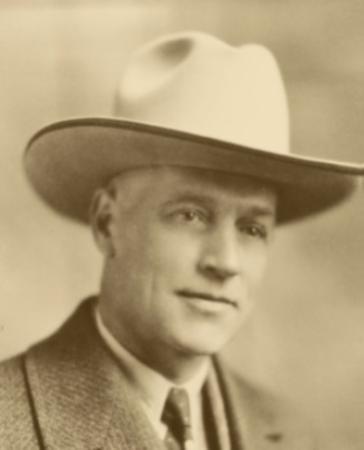Allan Atherton "Doc" Coburn
Allan Atherton "Doc" Coburn
August 31, 1884 - January 24, 1954
Allan Atherton “Doc” Coburn acquired his first taste of life in the American West in 1906 when he came from the Canadian eastcoast to visit his father, Dr. G. H. Coburn in Deadwood. Life on the frontier suited him, and by 1913 he had a job at First National Bank of Deadwood and had married Myrtle Ickes, daughter of Deadwood Pioneer John Ickes. In 1919, Doc and Myrtle purchased the Ickes’s insurance business in the corner of the Franklin Hotel and changed its name to A. A. Coburn Insurance.
Doc was deeply involved in the community. He belonged to the Olympic Club, and served as the assistant chief and secretary of the Homestake Hose Company. Doc also served at various times as the president, director and secretary of the Businessman’s Club, which would later become the Deadwood Chamber of Commerce. In the 1920s, the club began planning the celebration of Deadwood’s unique and colorful history that would become known as the Days of ‘76.
When the organizers of Belle Fourche’s Back Hills Round-Up got wind of Deadwood’s plans, they wrote to ask Deadwood cease and desist their rodeo festivities, so as not to compete. Doc, as the Days of ‘76’s first chairman, politely replied that not only would Deadwood have a rodeo, Deadwood’s rodeo would be bigger and better than any other rodeo around. Over the next 22 years, Doc kept his promise, helping to grow the Days of ‘76 into the Black Hills’ premier rodeo and celebration of western heritage and history.
Thanks to his friendship and insistence on including them in the Days of ‘76 celebrations, Doc was made an honorary member of the Oglala Lakota Sioux tribe. In gratitude, the tribe presented him with a buffalo skin coat inscribed with his Lakota name, “Mato Ska,” meaning White Bear.
Doc’s support for Deadwood was so fierce that, after years of watching tax dollars generated by Black Hills industries serve East River interests, he started a movement to have the Black Hills secede from South Dakota. The movement got the attention of politicians in Pierre and Washington D.C., resulting in changes that allowed more Black Hills tax revenues to benefit the communities where they originated.
“For 48 years,” wrote The Deadwood Pioneer Times, “Atherton Coburn has been a motivating force in Deadwood affairs. He actively supported every project, through all these years, that he believed would aid the city to progress and become a better place in which to live. Possessed of a keen, penetrating mind, he would go quickly to the heart of the problem and without delay, work out a satisfactory solution. His numerous kind deeds were performed so quietly that most of those he helped never knew from where the help came. Long will be felt and remembered by family and countless friends, his influence and the ideals which guided his full and rich life.”
Doc Coburn died on January 24, 1954 at the age of 70. He is buried in Mount Moriah Cemetery Section 8 Lot 1.

